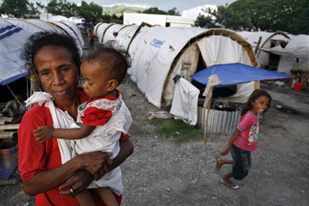Aid ‘fails to help E Timor’s poor’
Billions of dollars in aid has failed to filter into East Timor’s economy, report says.

According to La’o Hamutuk, a Dili-based research institute, $5.2bn was allocated by the international community over the past decade to projects in East Timor.
In addition another $3bn was spent on military and security, primarily by Australia and New Zealand.
| East Timor Aid |
|
Sources: Associated Press, World Bank, World Food Program, La’o Hamutuk |
But despite that money, data from the International Monetary Fund, the World Bank and various UN agencies paints a picture of widespread and enduring poverty.
Roads are in disrepair, there is little access to clean water or health services, and the capital is littered with abandoned, burned-out buildings where many of homeless live.
Charles Scheiner, one of the authors of the La’o Hamutuk report, told Al Jazeera “developing an economy is very difficult and very challenging and I think the UN and the international agencies that have been here haven’t really done it”.
Commenting on the figures, Jose Ramos-Horta, East Timor’s president and former independence leader, said that if even half of the international assistance had been spent more wisely, East Timor would have been lifted out of poverty.
“If that money, three to five billion dollars, were to have been mostly spent in East Timor it would have transformed this country economically and socially,” he told the Associated Press.
“We would have far better infrastructures. Our telecommunication, electricity would be far better. Poverty would have been all but eliminated. This is not the case.”
He said the “critical issue” that needed addressing was UN expenditure itself and on UN operations in East Timor.
“Where has this money has been invested? That is a question mark that requires reassessment by the donors.”
‘Progress’
 |
| Despite billions in aid, almost half of East Timor’s population remain mired in poverty [GALLO/GETTY] |
But Atul Khare, who has headed the UN operation in East Timor since 2006, dismissed the report, saying both its figures and the impression that aid had had little impact on East Timor were “absolutely incorrect”.
He said the country has made “considerable progress” since 1999.
“All these figures are a cause of concern, but they are extrapolations, they are not the real figures, and I would not rely on those figures for making assessments,” he said.
He said more accurate numbers would emerge after 2010, when the next national census is held.
Conceding that the economy and indices such as infant mortality and life expectancy had “improved a little bit” in the last 10 years, as the UN contends, Scheiner pointed out, however, that “we have to remember where we’re coming from”.
“So when the UN talks about 10 years ago … it may be true if they compare it with the lowest point in say October 1999, but if you compare it with May 1999 when the UN first came here … things were much better than they even are today in terms of basic services.”
Occupation
East Timor was once viewed as the poster child for UN nation-building.
After a 24-year occupation by Indonesia that left 174,000 dead, the people of the predominantly Catholic former Portuguese colony voted overwhelmingly in a UN-managed referendum in 1999 to separate.
The vote triggered a rampage by Indonesian soldiers and proxy militias who killed more than 1,000 people and destroyed much of East Timor’s infrastructure.
A provisional UN administration restored basic services, repaired buildings and resettled hundreds of thousands of people who had lost their homes.
With greater powers than any previous mission, the UN was supposed to help create the pillars of a new country, virtually from scratch.
But the vastness and complexity of the job became glaringly apparent and according to La’o Hamutuk, it is difficult to obtain consistent, complete or accurate data.
The research group says money destined for East Timor goes through many channels, such as trust funds, budgetary support for the government, UN missions, foreign military forces and donor managed projects inside and outside government agencies, all of which provide differing figures from that given by the government.
In addition, it says, at least 20 per cent of promised donations are never actually delivered.
 Estimated $8.8bn spent on aid and assistance (including peacekeeping) to East Timor since 1999.
Estimated $8.8bn spent on aid and assistance (including peacekeeping) to East Timor since 1999.